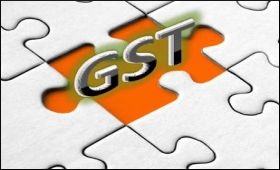|
|
|

|
2-yr wait for states not opting for GST compensation formula
|
|

|
|
| Top Stories |
 |
|
|
|
SME Times News Bureau | 21 Sep, 2020
States which failed to submit their options before the GST Council
meeting in October will have to wait for at least two years to get
compensation on Goods and Services Tax collection shortfall expected
during the transition period, Finance Ministry sources said on Monday.
The
sources said that such states will have to wait till June 2022 to get
compensation dues, subject to the condition that the GST Council extends
the cess collection period beyond 2022.
This is so because the
Council is expected to adopt one of the two options given by the Centre
to meet the GST compensation needs of the states this year.
The
states which decide against operationalisation of the new GST
compensation formula will get their dues only to the extent of
compensation cess collected in FY21 and distributed in proportion among
all states and union territories.
The balance shortfall will
only be met from the collection of GST compensation cess beyond the
five-year transition period that ends in June 2022. This will be subject
to GST Council approval to the extension of compensation cess.
The
GST Council, in its 41st meeting on August 27, 2020, had decided to
give its member-states two borrowing options to meet their compensation
shortfall and a response time of 7 working days from the formal receipt
of the detailed proposal on the options by email. Almost 15 states had
submitted their options by September 15 and more have joined since.
Option-1
on GST compensation brought before the Council last month allows states
to borrow, under a special dispensation from the Reserve Bank of India,
a sum of about Rs 97,000 crore shortfall calculated by the Centre that
is directly on account of GST implementation.
Option-2 allows
states to borrow the entire projected GST compensation shortfall of Rs
2,35,000 crore (total shortfall of Rs 3 lakh crore minus Rs 65,000 crore
collected as GST compensation cess) for FY21.
So far, 21 states/UTs have expressed preference for Borrowing Option-1 proposed by the Centre.
With
GST Act requiring voting for any resolution regarding an option by at
least 20 states, the move is expected to be adopted by the GST Council
at its meeting next month.
If this option is indeed adopted, all
states would be able to move ahead and borrow under the scheme suggested
by the Centre to meet their shortfall arising due to GST switchover. If
states still opt out, they will have to wait to get full compensation.
Among
the 21 states/UTs which support the first option on GST compensation
are Andhra Pradesh, Arunachal Pradesh, Assam, Bihar, Goa, Gujarat,
Haryana, Himachal Pradesh, Jammu and Kashmir, Karnataka, Madhya Pradesh,
Manipur, Meghalaya, Mizoram, Nagaland, Odisha, Puducherry, Sikkim,
Tripura, Uttarakhand, and Uttar Pradesh.
Manipur, the only state
which had earlier opted for Option-2, later preferred to change it to
Option-1. A few more states are, also, to give their borrowing option in
a day or two.
However, some of them like Jharkhand, Kerala,
Maharashtra, NCT of Delhi, Punjab, Rajasthan, Tamil Nadu, Telangana, and
West Bengal are yet to respond to the GST Council proposal to decide
their options.
Under the existing GST Act, compensation for
shortfall in GST collections over an agreed formula is payable by the
Centre for the first five years of the operation of the new tax system
from July 2017 to June 2022.
|
|
|
| |
|
|
|
|
|
|
|
|
|
|
|
|
|
|
| |
| Customs Exchange Rates |
| Currency |
Import |
Export |
US Dollar
|
66.20
|
64.50 |
UK Pound
|
87.50
|
84.65 |
Euro
|
78.25
|
75.65 |
| Japanese
Yen |
58.85 |
56.85 |
| As on 13 Aug, 2022 |
|
|
| Daily Poll |
 |
 |
| PM Modi's recent US visit to redefine India-US bilateral relations |
|
|
|
|
|
| Commented Stories |
 |
|
|
|
|
|
| |
|